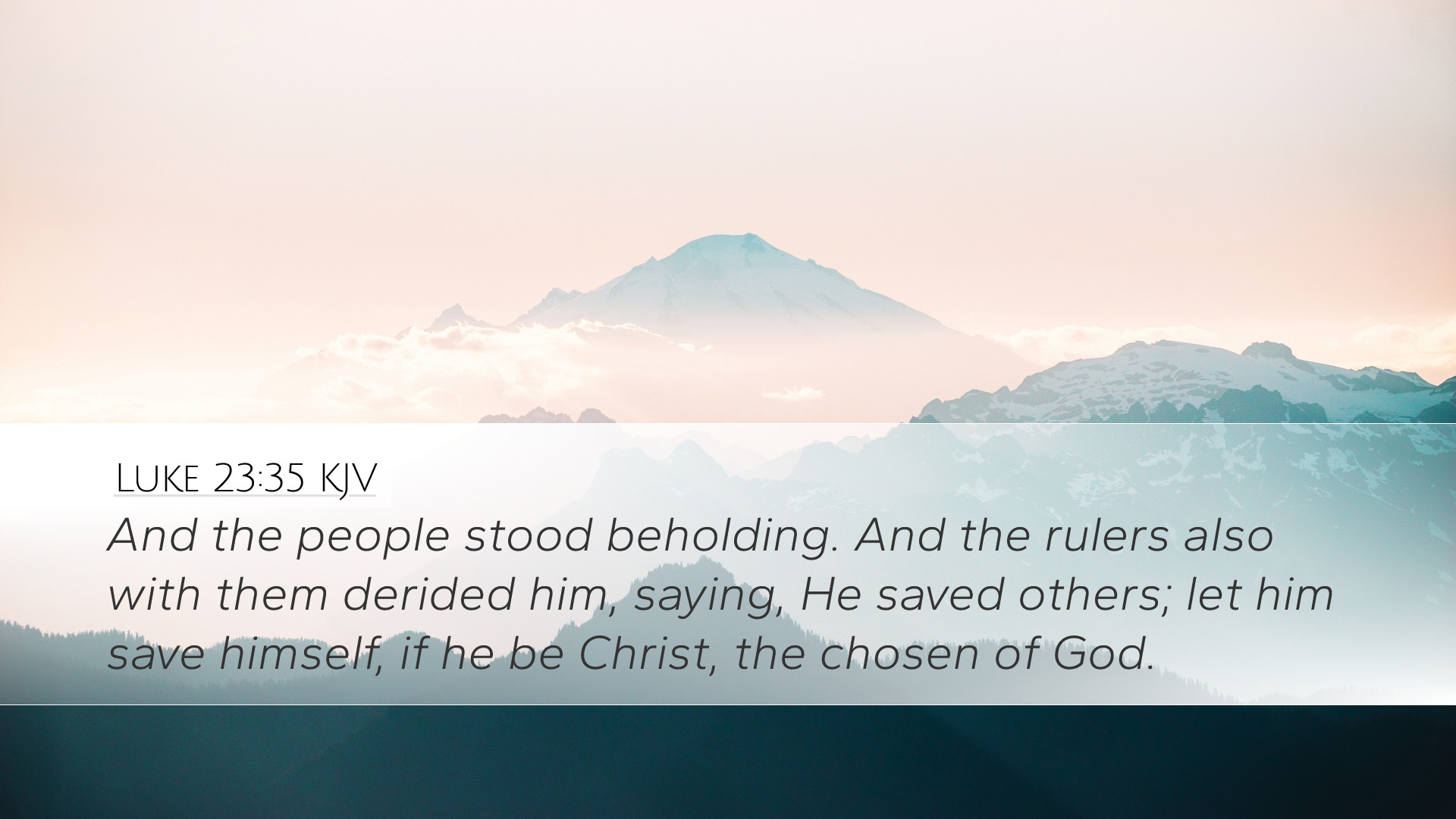Commentary on Luke 23:35
Luke 23:35 states: "And the people stood beholding. And the rulers also with them derided him, saying, He saved others; let him save himself, if he be Christ, the chosen of God."
Contextual Analysis
This verse occurs in the midst of Luke's Passion narrative, during the crucifixion of Jesus. It encompasses profound theological implications concerning the identity of Christ and the nature of his mission.
The setting highlights the mockery that Jesus endured from both the rulers and the bystanders, revealing the hardness of their hearts and their refusal to recognize the divine purpose at work.
Matthew Henry's Insights
Matthew Henry provides a detailed exploration of the mockery directed toward Jesus. He notes that the rulers' derision is indicative of their willful ignorance about Christ's true identity. They taunt him with the very truths that should have led them to repentance:
- Recognition of His Power: “He saved others” acknowledges Jesus' miracles and teaching.
- Challenge of Authority: The rulers challenge Jesus to save himself, highlighting their misunderstanding of divine kingship.
- Redemptive Purpose: Henry emphasizes that Jesus' refusal to save himself was part of God's redemptive plan, showcasing His commitment to the cross.
Henry concludes that the mocking reflects a deeper spiritual blindness and ultimately serves to fulfill the Scriptures regarding the Messiah's suffering.
Albert Barnes' Commentary
Albert Barnes elaborates on the significance of Jesus saving others but not Himself. He remarks that this irony illustrates a profound truth:
- Divine Irony: The challenges put forth by the rulers ironically affirm Jesus' authority; He did not save Himself because His mission was to save humanity.
- Understanding Christ's Kingship: Barnes stresses that true kingship in Christ is displayed through sacrifice, not through the exertion of power for personal escape.
- Implied Fulfillment: The mocking and derision fulfill prophetic Scriptures such as Psalm 22:7-8, reinforcing the notion that Christ was indeed the Messiah.
His commentary challenges readers to reconsider their own understanding of power and deliverance, urging them to reflect on the necessity of Christ's suffering in light of their salvation.
Adam Clarke's Reflections
Adam Clarke approaches the verse with a focus on the mocking crowd's behavior. He emphasizes several key points:
- Moral Responsibility: Clarke suggests that the behavior of the crowd exemplifies the moral failure of humanity, unable to recognize their Savior.
- Messianic Expectations: The expectations of a conquering Messiah clash with the image of the suffering servant, leading to disillusionment among the people.
- Call to Discernment: He calls on believers to discern beyond earthly circumstances and align with God’s spiritual realities.
Clarke’s commentary adds a vital dimension by challenging readers to confront their own biases regarding authority and deliverance.
Theological Implications
The combined insights of these commentators highlight several theological themes:
- Understanding Suffering: The verse challenges the perception of suffering, encouraging believers to see it as a means of grace and redemption.
- God's Plan of Salvation: The mocking illustrates the contrast between human expectations and God’s salvific purpose, emphasizing that salvation comes through the cross.
- Identity of Christ: The challenge "if he be Christ" compels an exploration of Christ's identity as both fully God and fully man, affirming His role as the sacrificial Lamb.
Practical Applications
This verse serves powerful reminders for contemporary readers:
- Responding to Mockery: Just as Jesus endured mockery, believers today are called to respond to ridicule with grace and conviction.
- Faith in Adversity: The assurance that Christ's mission was fulfilled despite scorn should inspire believers to remain steadfast in their faith, even in adversity.
- Living Out the Gospel: Recognizing the depths of Christ's sacrifice should embolden believers to share the Gospel boldly and effectively with others.
Conclusion
Luke 23:35 encapsulates a pivotal moment in the narrative of the crucifixion, where mockery reveals the deeper truths of God's plan for salvation. The insights from Matthew Henry, Albert Barnes, and Adam Clarke collectively underscore the importance of recognizing the redemptive work of Christ amidst human derision.
This commentary encourages deeper reflection for pastors, students, and scholars, challenging them to apply these timeless truths in their ministries and lives.


